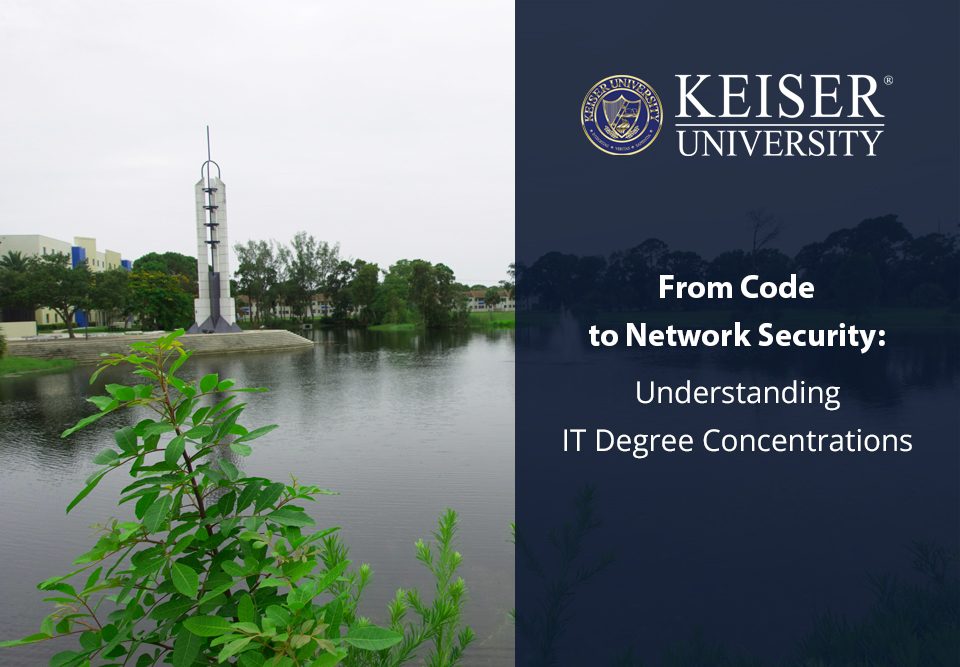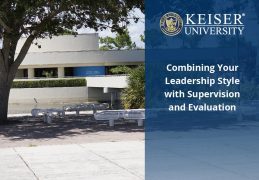Are you thinking about pursuing an advanced degree in information technology (IT) or a related field? Doing so could open the doors to new career and advancement opportunities while building your knowledge and skill set in this dynamic industry. As you weigh your options for IT graduate degrees, however, you may notice there is a vast range of IT degree concentrations available.
Is an information technology concentration right for you? And, if so, how can you choose the best one? Explore a few factors to take into consideration before you start submitting graduate school applications.
Benefits of an IT Degree Concentration
First, understand what a concentration is and what it entails. Not all schools offer them, but concentrations (also sometimes referred to as “tracks”) are highly specialized areas of study within a degree program. They are most commonly found in degree programs that revolve around a larger and broader industry (such as IT), allowing students to focus their studies on a specific niche or subset within the industry.
How IT Concentrations Prepare Students for Industry Needs
There are many potential benefits to pursuing an IT degree certification, particularly when you consider the numerous subfields within the expansive realm of information technology. By pursuing a concentration, you can focus your studies on an area of the field in which you are most interested. In addition, you are able to build highly advanced skills and knowledge in your chosen concentration — which may make you better suited for specialized roles in the field.
An IT degree program with a career-centered concentration can also give you a chance to network with professionals in your field while making your time in graduate school more enjoyable, as you will be studying topics that are of genuine interest to you.
Popular IT Degree Concentrations
Though this is by no means a comprehensive list of every IT concentration offered, below are some of the most popular IT degree concentrations being pursued by students today:
Software Development and Engineering
A software development and engineering concentration can be a great environment for students to learn about common programming languages used as well as the various stages of the software development process.
Network, Systems Security and Cybersecurity
With today’s growing threat of cyberattacks, the need for cybersecurity professionals continues to increase. According to the United States Bureau of Labor Statistics (BLS), the job outlook for information security analysts is expected to grow 33% between 2023 and 2033. This type of concentration can be ideal for IT professionals who want to make a difference in thwarting web attacks while protecting sensitive data.
Data Management and Analytics
With more data being generated and collected than ever before, in turn, IT professionals with specialized knowledge in data management and analytics are in high demand. In this type of IT concentration, professionals can learn about key topics such as data analysis, project management and business intelligence.
Artificial Intelligence (AI) and Machine Learning
As the use of AI and machine learning becomes more prevalent, so does the need for IT professionals who know how to apply these technologies and use them to their advantage. A concentration in AI and machine learning can be an excellent way for IT professionals to learn how to use these technologies to improve data security, automate tasks and make organizations more efficient.
IT Management and Project Leadership
If you are interested in advancing into an IT leadership role, then a concentration in IT management and project leadership could help you build the project management, communication and leadership skills needed to thrive in this demanding career path.
Career Opportunities by Concentration
What can you do with an IT concentration? The following sections outline some popular opportunities.
Careers in Software Development
- Software engineer/developer – A professional who designs computer programs and applications for clients and end users.
- DevOps engineer – IT professional whose job responsibilities combine aspects of both operations and development.
- Web developer – IT experts who create, develop, test and maintain websites to ensure they are functional and usable.
- Full stack developer – A professional who handles both front- and back-end aspects of a software program, application or other system.
Cybersecurity Job Roles and Responsibilities
- Information security analyst – A cybersecurity professional who plans and executes security measures to keep computer networks and systems protected against attacks.
- Vulnerability analyst – A cybersecurity expert whose job it is to identify and fix weaknesses in security networks.
- Risk management specialist – A professional who identifies, analyzes and mitigates cybersecurity risks within a company or organization.
Data Management and Analysis Positions
- Data engineer/scientist – A data professional who uses analytical tools and other resources to gain valuable insights from large amounts of data.
- Project manager – Management professionals who lead teams from the beginning to the final execution of a project.
- Computer/IT support specialist – An IT professional tasked with maintaining computer networks and systems, usually for a larger company or organization.
- Database architect/administrator – A data management professional who designs, organizes and maintains databases to store secure data.
Cloud Computing Specialist Careers
- Cloud architect/engineer – An IT professional who handles all aspects of an organization’s cloud computing needs, ranging from cloud adoption to application design and management.
- Cloud security engineer – An IT professional responsible for improving and optimizing security within a cloud network.
- Cloud consultant – An IT professional who makes specialized recommendations to businesses and organizations regarding their cloud computing needs. Some cloud consultants may also work as cloud architects and engineers, offering clients services to execute their cloud computing plans as well.
Choosing the Right IT Concentration for You
If you are leaning toward pursuing an IT degree with a concentration, you may be wondering which concentration is right for you. Of course, there is no one-size-fits-all answer here; this will ultimately boil down to your own personal interests, strengths and professional goals.
Assessing Personal Strengths and Career Goals
If you have studied information technology in the past (such as in your undergraduate degree program), consider what your favorite courses were and where your strengths seemed to lie. For example, perhaps you found cybersecurity particularly interesting — or maybe you were more drawn to learning about artificial intelligence and similar technologies. From there, you can compare your favorite topics with your own career and professional goals to determine which concentration(s) may be most suitable to your needs.
Industry Demand for IT Specializations
Now is also a good time to consider what kinds of concentrations, skills and knowledge are most in demand within the IT field. According to the BLS, for instance, the demand for computer and information systems managers is projected to grow by 17% between 2023 and 2033 alone; that is much faster than the national average for all occupations. With this in mind, a concentration in IT management and/or leadership could be a sensible choice for those looking to build in-demand skills.
Future Trends and Technological Advancements in IT
In addition to current demand for IT specializations, it is also wise to think into the future when deciding on the IT concentration that may be best for you. While nobody can predict precisely what the future will bring, some trends and technological advancements are already beginning to shape the IT industry. One prime example is the use of artificial intelligence and machine learning technology, which are being leveraged to automate cybersecurity processes and even detect or prevent threats in real time.
Looking at emerging trends can be an ideal way for those pursuing an IT degree to choose a relevant concentration that may set them up for long-term career success and advancement opportunities.
Skills Taught in IT Concentrations
What kinds of skills can you expect to learn in an IT concentration? This will depend on the specific program you choose, but there are certain core technical skills and competencies you can generally expect to expand upon in an IT program at the graduate level.
Core Technical Skills in Software and Systems
Those who opt for an IT concentration in software and/or computer systems will likely develop technical skills in the following areas:
- Programming languages
- Operating systems
- Databases
- Cloud computing
- Software debugging
Analytical Skills in Data and Network Security
Meanwhile, those in cybersecurity and network/data security IT programs should expect a greater focus on analytical skills. This is especially true when you consider the need for cybersecurity professionals to effectively analyze vast volumes of data to pinpoint patterns, trends and other important insights. Some specific skills that may be honed throughout these kinds of programs include:
- Data interpretation
- Anomaly detection
- Incident analysis
- Data visualization
- Threat modeling
Critical Thinking and Problem-Solving
Regardless of which concentration you choose, you can also expect to build upon your critical thinking and problem-solving skills as part of a master’s-level IT program. Across the IT field, professionals need to be able to analyze and think critically about complex problems while making informed decisions.
Real-World Applications of IT Concentration Skills
An IT degree with a concentration can prepare you for many real-world scenarios and challenges in your future work, particularly when it comes to solving complex business issues and optimizing operational efficiency.
Solving Complex Business Problems With IT Solutions
With the knowledge and skills gained in an IT program, professionals can put their problem-solving and analytical expertise to work in order to identify and resolve even the most complex of business issues. For instance, a business suffering from security vulnerabilities could benefit from a robust cybersecurity audit and IT tools (like antivirus software and firewalls).
Enhancing Operational Efficiency With IT Expertise
Additionally, IT professionals with an advanced degree can apply their skills to maximize operational efficiency. By keeping IT systems running more smoothly, businesses can cut down on operating costs while optimizing productivity and profits.
Ready to Learn More About IT Degrees and Concentrations?
From software development and data management to project leadership and AI, there are plenty of potential IT concentrations to consider as you prepare for your graduate degree program. Ultimately, the right concentration will depend on your personal strengths, career goals and other factors. However, with some careful consideration and research, you can determine which concentration may be best for you.
Still seeking a degree program that offers a wide selection of IT degree concentrations? If so, be sure to explore the options available at Keiser University Graduate School. Here, we are proud to offer specialized degree programs in the following IT-related industries:
Whether you select an information technology concentration or the Master of Science in Financial Technology (FinTech), you can rest assured that Keiser University students are supported with flexible scheduling to suit even the busiest of schedules. Get in touch with a graduate admissions counselor to learn more about any of our career-focused programs, or get started with your online application for admission today.





 The instructors at Keiser University impacted my life. They believed in my ability to become a great graphic designer, regardless of how I felt about my skills. KU helped to prepare me for the real world and got me to where I am today.
The instructors at Keiser University impacted my life. They believed in my ability to become a great graphic designer, regardless of how I felt about my skills. KU helped to prepare me for the real world and got me to where I am today.
